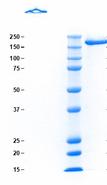
Thrombospondin
Product Sizes
0.025 mg
16-20-201319-0.025MG
0.1 mg
16-20-201319-0.1MG
1 mg
16-20-201319-1MG
5 mg
16-20-201319-5MG
About this Product
- SKU:
- 16-20-201319
- Additional Names:
- Cardiovascular Disease, Kidney Disease, Coagulation, Angiogenisis, Cancer, Infection , Inflammation, In Vitro Diagnostic|THBS1, THBS, TSP1, TSP, Thrombospondin-1, Glycoprotein G
- Buffer:
- Lyophilized from 20 mM Tris-HCl, pH 8.0, with 600 mM NaCl, 2 mM CaCl2, and 20% sucrose. Reconstitution: After centrifugation, we suggest addition of de-ionized H2O to the original volume, followed by
- CE/IVD:
- RUO
- Extra Details:
- Thrombospondin is a multifunctional family of secreted glycoproteins, best known for their central role in mediating cell-to-cell and cell-to-matrix interactions within the extracellular matrix. The most studied member, thrombospondin-1 (TSP-1), is a matricellular protein that regulates diverse biological processes, including cell adhesion, migration, proliferation, apoptosis, and angiogenesis. TSP-1 is a key modulator of platelet aggregation and is released from platelet A Alpha-granules upon activation, where it interacts with fibrinogen and other receptors to influence coagulation and platelet function. Beyond hemostasis, TSP-1 exerts potent antiangiogenic effects by inhibiting endothelial cell migration and proliferation, and by activating transforming growth factor-beta (TGF-B Beta), thus contributing to tissue remodeling and fibrosis. Dysregulation of thrombospondin expression is implicated in several diseases. Elevated TSP-1 levels are associated with renal disease, where it promotes fibrosis and contributes to the progression of chronic kidney disease. It also plays a role in cardiovascular diseases, obesity, diabetes, and cancer, influencing immune responses, tumor growth, and metastasis. Clinically, thrombospondin is being explored as a biomarker for platelet activation, renal dysfunction, and certain cancers, such as pancreatic and cholangiocarcinoma, with potential diagnostic and prognostic applications. Its diverse functions and disease associations make thrombospondin a promising target for therapeutic intervention and biomarker development.
- Formulation:
- Lyophilized from 20 mM Tris-HCl, pH 8.0, with 600 mM NaCl, 2 mM CaCl2, and 20% sucrose. Reconstitution: After centrifugation, we suggest addition of de-ionized H2O to the original volume, followed by
- Molecular Weight:
- 420,000 Da
- Physical State:
- Lyophilized
- Purity:
- ≥95%
- Purification:
- Liquid Chromatography Methods
- Shipping Conditions:
- Blue Ice
- Source:
- Prepared from platelets shown to be non reactive for HBsAg, anti-HCV, anti-HBc, and negative for anti-HIV 1 & 2 by FDA-required tests.
- Storage Conditions:
- Please refer to datasheet
- Supplier:
- Athens Bioscience, Inc.
- Type:
- Proteins, Peptides, Small Molecules & Other Biomolecules: Recombinant Proteins


